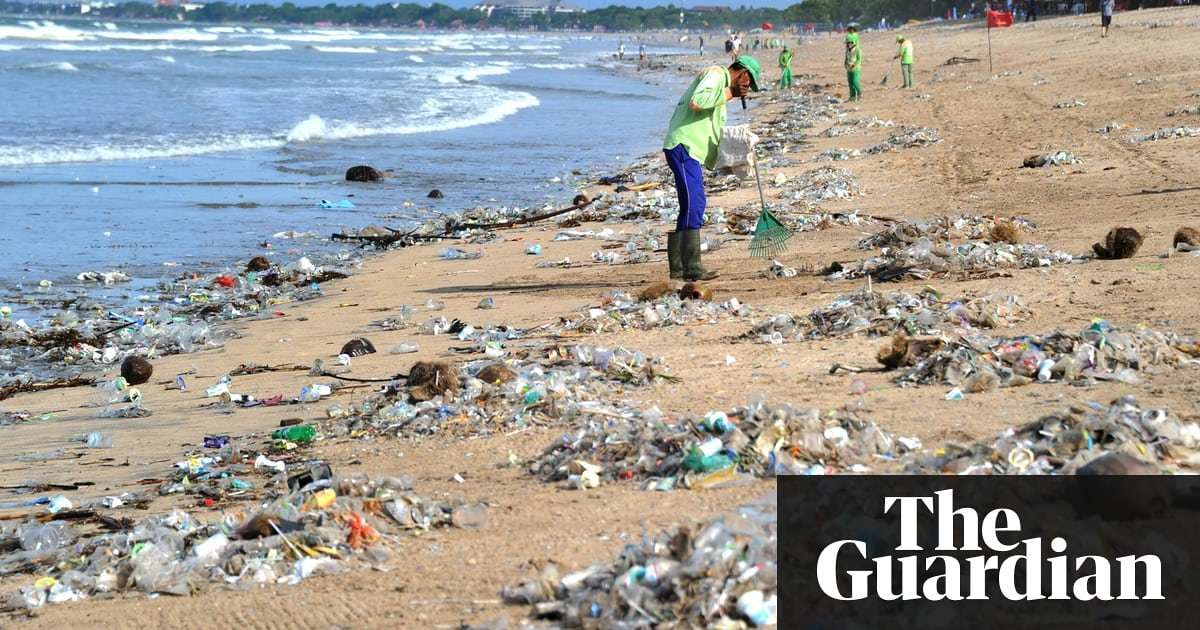Thousands will join the One Island One Voice cleanup of beaches, rivers and jungles
Overwhelmed by tides of waste and decades of mass tourism, to some, the Indonesian island of Bali is a paradise long lost.
This weekend, however, thousands of people will join in an effort to rid its coastline, rivers and jungles of rubbish and restore its natural beauty.
The mass cleanup is the initiative of One Island One Voice(OIOV), an umbrella movement of organisations and individuals wanting to reduce waste and create a “greener, cleaner Bali”.
The movement includes groups such as Bye Bye Plastic Bags, an NGO founded by two Balinese teenage sisters, Melati and Isabel Wijsen, who want Bali to ban plastic bags.
Facebook Twitter Pinterest Melati and Isabel Wijsen started Bye Bye Plastic Bags after being inspired by a lesson at school. Photograph: BBPB
“This event is not only a cleanup action, it is a chance to raise awareness and understanding about what really happens in Bali,” said Rima Agustina, one of the coordinators.
She said the action was as much about changing attitudes as cleaning up beaches. “All it takes is one or two hours of picking up trash and for most people the mindset is completely transformed. They would start thinking that those single-use plastics give more harm than benefits to community.”
Bali’s beaches have been swamped by unsightly mounds of rubbish for months, much of it plastic washed in from neighbouring Java during the annual rainy season – or what Balinese call rubbish season.
The waste has become such an issue that tourists are being scared away.
Quick guide About this series Show Hide What is The Upside? News doesn't always have to be bad – indeed, the relentless focus on confrontation, disaster, antagonism and blame risks convincing the public that the world is hopeless and there is nothing we can do. This series is an antidote, an attempt to show that there is plenty of hope, as our journalists scour the planet looking for pioneers, trailblazers, best practice, unsung heroes, ideas that work, ideas that might and innovations whose time might have come. Readers can follow up with our Further Reading guides and can also recommend other projects, people and progress that we should report on by contacting us at [email protected].
Sign up here for an upbeat weekly email roundup of the best from this series
“Many tourists have reported that they don’t want to come back to Bali after seeing how bad the trash is,” said Sara Craves, an OIOV spokeswoman.
Indonesia is the second-largest plastic polluter in the world after China, with 200,000 tonnes of plastic flowing into its oceans via rivers and streams each year.
The initiative echoes other movements around the world trying to tackle the steady burial of the earth’s beauty under mounds of consumer jetsam.
Volunteers in Mumbai have been waging war on detritus on the city beaches for several years. Readers of this series, The Upside, have been in touch to point to local initiatives everywhere from Devizes in England to Lodwar in Kenya.
It’s the idea of really focusing in on places that make up this experience of living in Bali Harriet Burrows, teacher at Green School
The OIOV initiative will collect tonnes of rubbish in every region in Bali and take it to village-scale and industrial sorting centres. Some will be upcycled or turned into EcoBricks.
The significant quantities of waste that flow over from Indonesia’s larger islands are one element of the problem in Bali.
A small island ill-equipped to cope with endless hotel developments and the millions of tourists that visit each year, Bali alone produces about 5,000 cubic metres of waste a day.
With five legal rubbish dumps on the island, only about 25% of its waste is collected through official channels. The rest is burned, or dumped on roadsides and mountains and in rivers and the ocean.
Harriet Burrows, a British teacher from Bali’s Green School, will be attending cleanups on Saturday, accompanied by kindergarten and high school students and their parents in what she says is a whole-community event.
“People can take part in three cleans in one day, which is pretty incredible,” said Burrows. “So you can go from where you live to the beaches where you walk your dog, to the beaches where you surf, so it’s the idea of really focusing in on places that make up this experience of living in Bali.”
Saturday’s event even has its own theme song, Satu Pulau Satu Suara, or One island one voice, a collaboration between local and international musicians that calls for the island to be left “just the way we found her”.
The cleanup organisers say they do not expect to turn Bali’s rubbish woes around overnight.
“Cleanups are not the solution,” said Craves. “They are just the way to raise awareness and a way to bring people together, and get them involved in the problem so we can start to find solution.”
This article is part of a series on possible solutions to some of the world’s most stubborn problems. What else should we cover? Do you know of any similar initiatives to the Bali effort? Email us at [email protected]

drop247 on February 26th, 2018 at 17:02 UTC »
It's not just tourists. I've been to non-tourist places in Indonesia and they're covered in garbage. It's a cultural issue.
stephentheheathen on February 26th, 2018 at 15:27 UTC »
Most of the polluted places I've travelled the tourists are the only ones that seem to care at all about not littering....problem is usually infrastructure
Ayy_2_Brute on February 26th, 2018 at 15:24 UTC »
The entire region's approach to plastics and waste has long been a problem and they're now reaping what they sowed. Events like this will go a long way towards changing mindsets over there, so I hope this is just a start.